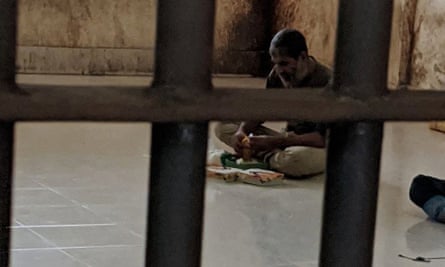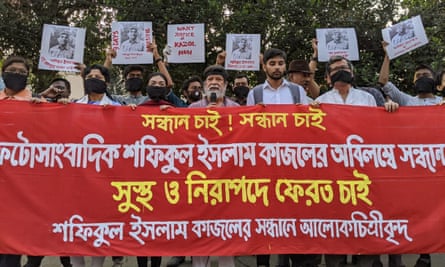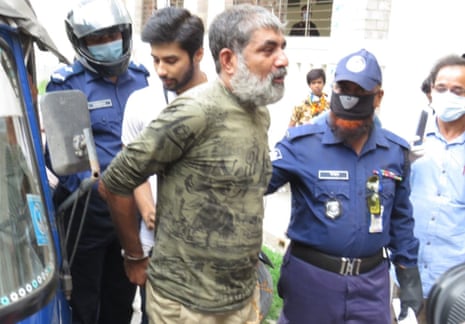Fifty-three days after he disappeared, Bangladeshi journalist Shafiqul Islam Kajol turned up on Sunday in police custody at a border town 150 miles from where he had last been seen.
“I am alive,” he told his son by phone, the first time the family had heard his voice since his disappearance in early March, a day after a case was filed against him and 31 others under the country’s controversial new Digital Security Act.
The family rushed to see him but had only a brief opportunity to talk to him at court as he was jailed for trespassing and for Facebook posts that fell foul of Bangladesh’s “highly repressive” internet law.
“He was scared, he was worried, he was crying and breaking down every one or two sentences,” said Kajol’s son, Monorom Polok.
Amnesty International has said Kajol faces seven years in prison under the digital security act and his family has begged authorities to release him to protect him from the threat of Covid-19 inside Bangladesh’s crowded prisons.
“We cannot go to sleep, we cannot eat because he’s vulnerable,” said Polok, who said the family are worried as they still do not know where his father was during those two months and whether he may have caught the coronavirus.
“My father is not a criminal, he has only been charged and none of these charges are violent crimes,” he said. “We don’t know in the crowded prisons of Bangladesh how long he can stay away from coronavirus.”

Rights groups suggested Kajol may have been forcibly disappeared on 10 March, a day after the case was filed against him by a ruling party politician for sharing a Facebook that “could deteriorate law and order”.
CCTV footage released by his family showed three men apparently tampering with Kajol’s motorbike before he vanished.
Amnesty said his arrest followed posts he wrote criticising an alleged sex-trafficking ring run by an official in the ruling Awami League.
Press freedom group Reporters Sans Frontières said Kajol’s arrest was “extremely shocking”.
“We call on the Bangladeshi prosecutor’s office to order this journalist’s immediate release and to appoint a serious team of investigators to establish how he came to be abducted all this time, which is very mysterious,” said RSF Asia-Pacific head Daniel Bastard.
There have been 1,000 cases filed under the digital security act since it was introduced in 2018 and, according to Bangladeshi human rights monitor Odhikar, it has been used largely by politicians and businessmen.
A letter signed by more than 300 prominent Bangladeshi figures on Wednesday called on the government to release all those arrested under the digital security act including a cartoonist, a writer and an activist arrested this week.

One of the signatories was Shahidul Alam, an internationally renowned photojournalist arrested in an alleged attempted forced disappearance after his coverage of protests that brought the capital Dhaka to a standstill in 2018.
According to Odhikar, 59 journalists have been sued, attacked, threatened or injured for their work in the first three months of this year.
More than 550 people have been disappeared in Bangladesh since the Awami League took power in 2009, according to Odhikar’s statistics.
